
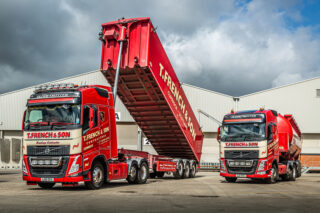
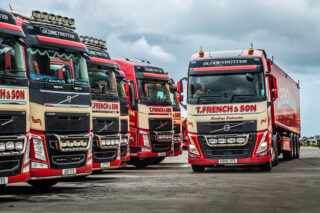
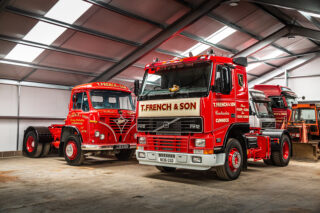
ESTABLISHED IN THE 1960s, T FRENCH & SON IS A BULK HAULIER AT ITS CORE BUT ONE THAT PROVIDES A TEXTBOOK EXAMPLE OF HOW TO MOVE WITH THE TIMES AND DIVERSIFY, AS BULK & TIPPER FINDS OUT
Almost 20 miles west of the M74’s Millbank Interchange, along the twisting and serpentine A70, the terrain plateaus and there sits a sprawling, impressive and unmissable sight, the premises of T French & Son, a seasoned bulk haulier and, as we’re about to find out, so much more.
Few family-run companies can claim such deep roots to their home as T French & Son. Tom French senior, now 79 years old, was born right here, where the family once had a farm. The 80-acre site is now home to a variety of different operations, being transformed gradually over the years as the family’s business interests have diversified and grown. It was 1967 when Tom senior started a haulage operation with a Seddon 4-wheel tipper, working for a local brickworks. With his farming background, he also spent time hauling cattle and moved a lot of combine harvesters from the Massey Ferguson factory at Kilmarnock, which at its peak was producing 4,000 machines annually before eventually closing its doors in 1980.
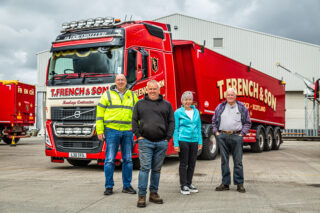
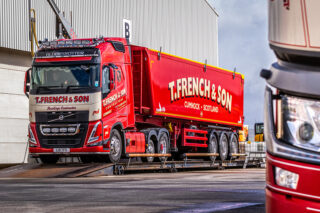
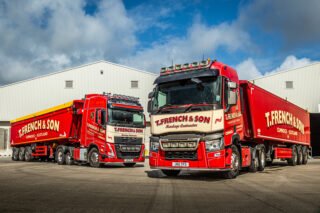
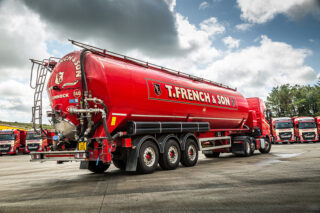
MOST TIPPER OPERATORS STRUGGLE TO GET 20 TONNES OF PAYLOAD ON THEIR TRUCKS, BUT YORKSHIRE FIRM NEWLAY ASPHALT RECKONS IT HAS FOUND A WAY TO REACH THIS MIRACULOUS GOAL, AS BULK & TIPPER REPORTS.
Achieving a 20-tonne payload on a 32-tonne 8-wheeler is the Holy Grail for many tipper operators. And like the Holy Grail, you may think it is in reach… yet somehow, it still manages to slip away from you.
It is a target that Newlay Asphalt is managing to achieve consistently, however, according to the firm’s operations director Jamie Brown. It is doing so using 8×4 Renault Trucks C chassis fitted with insulated alloy tipper bodies built by Weightlifter Bodies subsidiary PPG Fabrications, and Edbro front-end tipping gear. As the operator’s name suggests, these are used to transport asphalt. “The bodies are proving very durable,” Jamie comments.
With a head office in Brandesburton in East Yorkshire, Newlay operates two asphalt plants – one in Dewsbury in West Yorkshire, and a newly-established one near its headquarters on the Catfoss Industrial Estate.
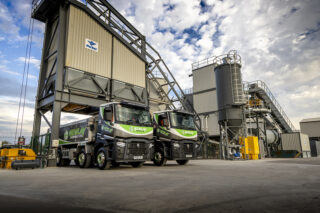
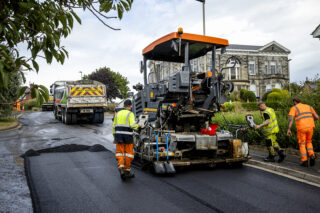
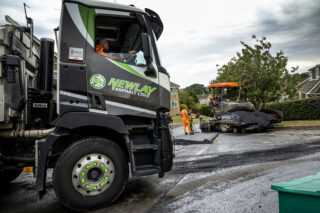
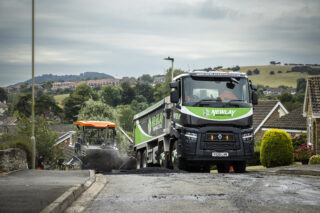
With 124 pages of first-class niche transport content, what more could you wish for? Click the appropriate link below to purchase your annual subscription, or an individual copy.
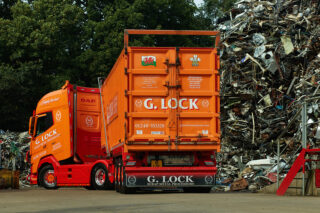
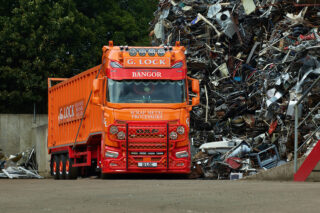
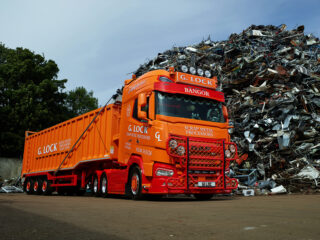
G LOCK SCRAP METAL PROCESSORS MARKED ITS CENTENARY IN 2023 WITH AN EYE-CATCHING DAF XG+ 530. AND FOR THIRD-GENERATION OWNER PHILIP LOCK, THE COMPANY HAS BEEN A WAY OF LIFE FOR ALMOST 60 OF THOSE YEARS, AS BULK & TIPPER REPORTS
If you’ve been on the A55 in the past 18 months or so, the chances are you’ve seen G Lock Scrap Metal Processors’ stunning DAF XG+ 530 on it. If you have, you’ll know about it – the truck has a memorable orange and red livery that makes it instantly recognisable.
The top-of-the-range DAF XG+ 530, which went on the road in December 2023, was bought to celebrate the company’s centenary and was sourced from Motus Commercials in Wrexham.
Understandably, the boat was pushed out for it. Driver Huw Jones says all the boxes were ticked at the factory, and after that it went to FTN in Nescliffe near Shrewsbury to get lightbars, infills and bull bars fitted, as well as Dutch stacks. From there, it went to Gary at St Martin’s to spray-paint the chassis, as well as adding company logos and a nod to the company’s 100th anniversary.
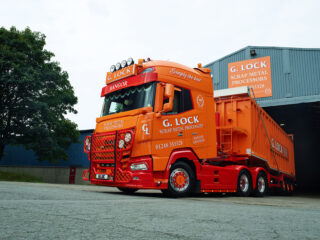
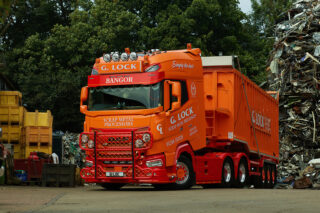
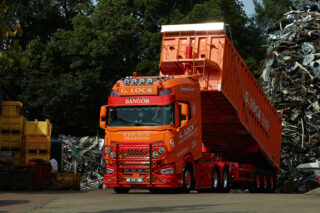
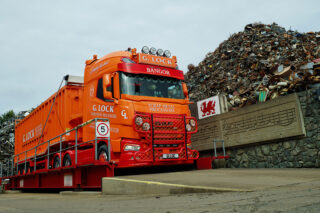
WHETHER IT’S BUILDING STONE SEA DEFENCES OUT OF NORWEGIAN ROCK, CONSTRUCTING FACILITIES FOR HAULIERS OR SAVING HISTORIC BUILDINGS, EARLCOATE CONSTRUCTION AND PLANT HIRE’S CIVIL ENGINEERING EXPERTISE CANNOT BE OVERSTATED. AND NOR CAN THE TOUGHNESS OF ITS TRUCKS, WRITES BULK & TIPPER
Venture to the heart of the New Forest in the south of England and you’ll find the headquarters of Earlcoate Construction and Plant Hire – a business established by Alister Cutts in 1997. But much of its current work takes it to the water’s edge, where its projects have included sea defences and dock developments. A family business that recognises one of its biggest assets is its people – many of the staff have been involved with the company or known to Alister for decades – Earlcoate has been through a few iterations and changes, but is now settled on sticking to what it knows best, which extends to the haulage fleet and associated plant equipment.
“We’ve got some outstanding people here, such as my cousin Samuel Chappell, who worked for Chappells of Stubbington – a heavy haulage business – who came to join us when his business closed,” explains Alister.
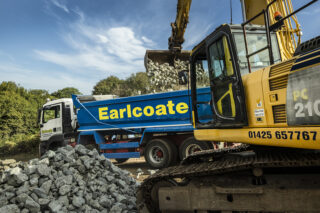
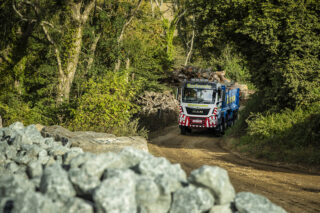
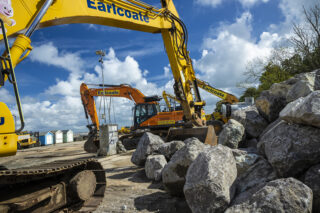
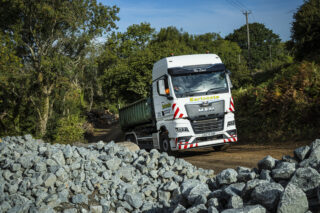
With 124 pages of first-class niche transport content, what more could you wish for? Click the appropriate link below to purchase your annual subscription, or an individual copy.
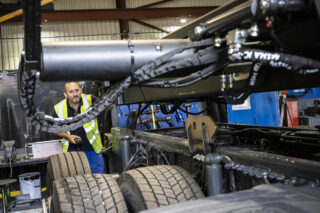
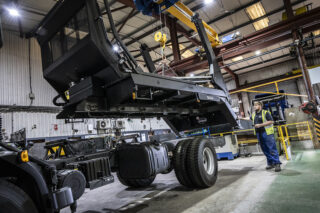
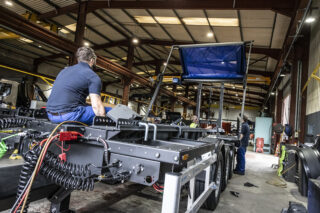
WHEN AILING HOOK-LOADER AND SKIP-LOADER MANUFACTURER BOUGHTON ENGINEERING WAS ACQUIRED BY SKAN GROUP HOLDINGS, ITS NEW OWNER SET ABOUT REFINING ITS PRODUCTS AND PROCESSES TO ENSURE ITS LONG-TERM SUCCESS, WRITES BULK & TIPPER
Almost every hook-loader and skip-loader operator in the UK will be familiar with Boughton Engineering’s equipment. In many sectors, its hook-loaders are considered an industry standard. The basic design has changed very little since its introduction back in the 1970s, because customers are more than happy with the performance and reliability of the products and there is no need to change. And the skip-loader design is equally well regarded.
Boughton’s product range also includes bespoke drawbar trailers for use with hook-loaders, allowing operators to dramatically increase productivity in carrying two containers, running at up to 44 tonnes GVW. This obviously works well when waste or recycled materials are transported over longer distances, and if the hook-loader equipment and the drawbar trailer are designed by the same manufacturer, they will be well matched, improving performance and efficiency.
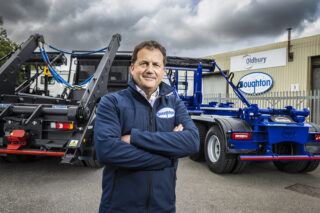
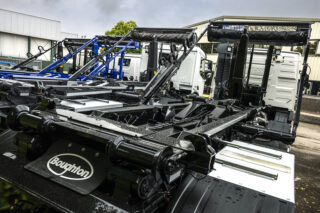
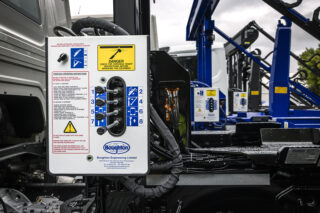
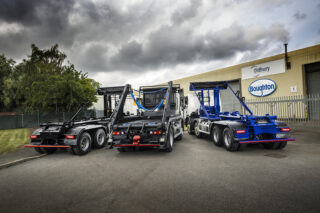
SOME FIRMS STRUGGLE TO DEAL SUCCESSFULLY WITH JUST A SINGLE OPERATING ACTIVITY. BUT DEVON FIRM RL TAYLOR IS SHINING BRIGHT DESPITE HANDLING THREE AT ONCE, AS BULK & TIPPER FINDS OUT
Looking at the RL Taylor Haulage depot in Devon, right in the middle of the countryside close to Okehampton and surrounded by fields and farms, you could be forgiven for thinking the family-owned business’ fleet of rigid and articulated bulk tippers – which move grain, feedstuffs and other commodities from farms, stores and other locations to mills, docks and factories – were the beginning and end of its story. But there is far more to the operation than just this.
It provides contract stone crushing and screening services in many of the quarries in this part of the world, for a start, with a fleet of large excavators, loading shovels, tracked crushers and screening machines. And then there is its busy heavy haulage operation, which runs lowloaders that can shift loads of over 100 tonnes, using a fleet of heavy-duty Scania and Volvo tractor units and a variety of sophisticated specialist trailers with hydraulic power steering to cope with the narrow, twisting and hilly roads in this part of the West Country. The lowloaders are used to move both Taylor’s own machinery and third party equipment, along with other oversized loads.
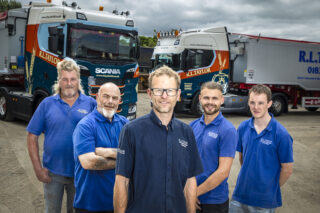
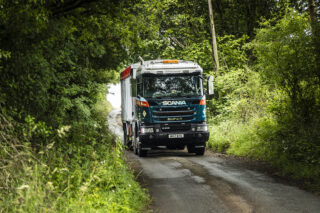
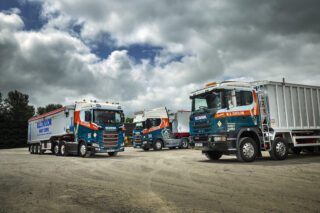
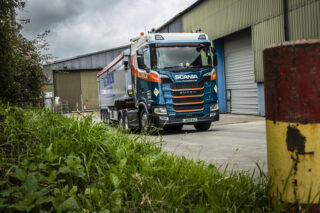
With 124 pages of first-class niche transport content, what more could you wish for? Click the appropriate link below to purchase your annual subscription, or an individual copy.